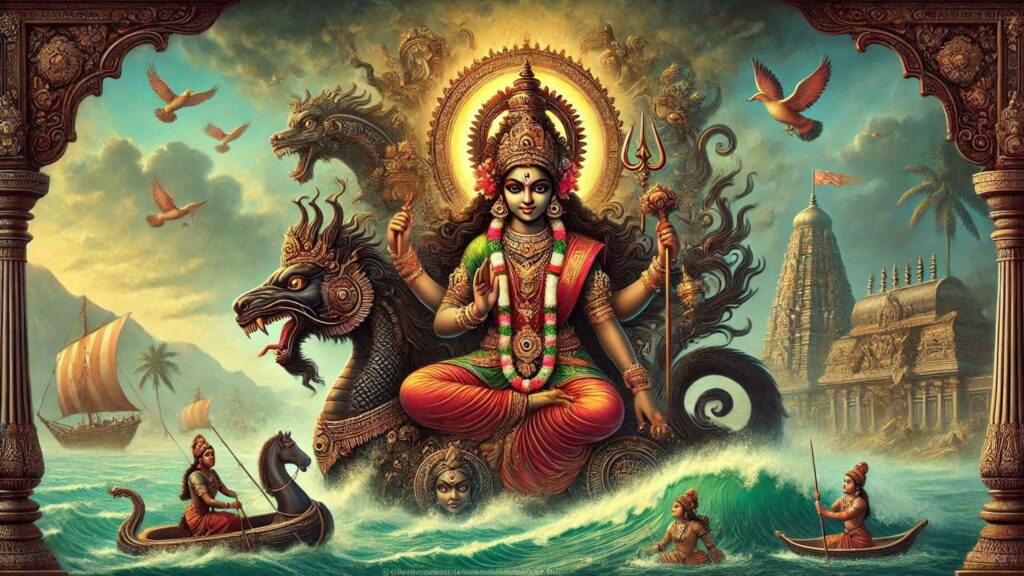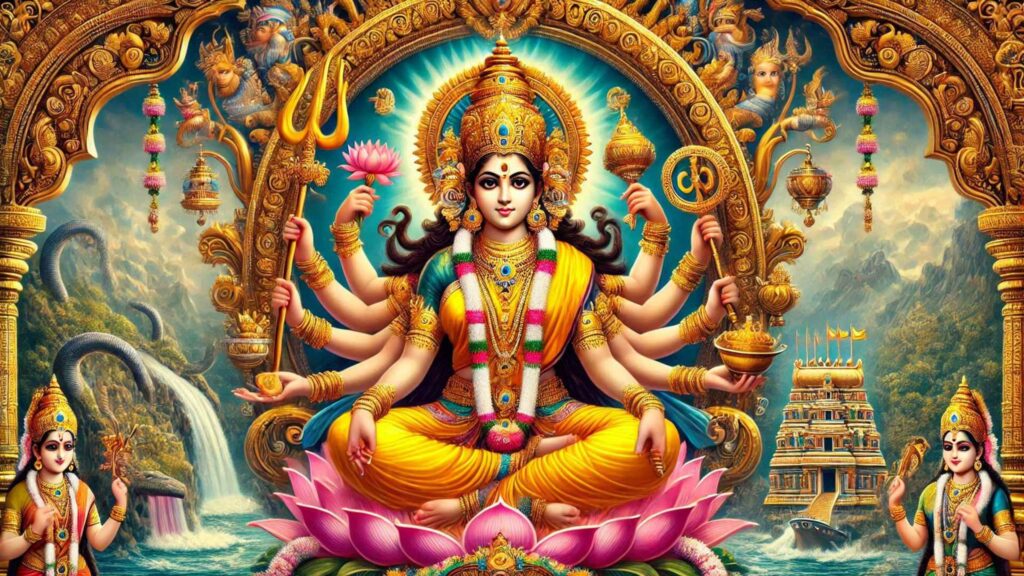Yellamma: The Divine Mother and Protector in Hinduism
Introduction
Yellamma, also known as Renuka, is one of the most venerated goddesses in Hinduism, particularly in southern India. Known as the goddess of the masses and the protector of the downtrodden, Yellamma embodies maternal care, forgiveness, and the enduring strength of womanhood. She is associated with the concept of divine feminine energy and is worshipped as a deity of transformation, fertility, and sustenance.
Read More About Deities And Gods
Significance in Daily Hindu Life
Yellamma holds a significant place in the hearts of millions. Her worship transcends barriers of caste and creed, emphasizing inclusivity. Daily rituals and festivals dedicated to her serve as a reminder of divine grace and the strength of human resilience in the face of adversity.
Cosmic and Spiritual Importance
Cosmically, Yellamma represents the cyclical nature of life—birth, sustenance, and renewal. Spiritually, she signifies the journey from ignorance to enlightenment, guiding devotees toward self-realization and liberation (moksha).
Names and Etymology

Meaning of Yellamma
The name “Yellamma” is derived from the Kannada words Ellu (all) and Amma (mother), meaning “Mother of All.” It reflects her universal motherhood and nurturing nature.
Other Names and Their Significance
- Renuka – Her original name, representing her chaste and virtuous nature.
- Jagadamba – Universal Mother, highlighting her role as the nurturer of creation.
- Shakti – Symbolizing her divine energy and power.
- Devi Renukamba – Combining her name with her divine status as a goddess.
Symbolism and Iconography

Physical Description
Yellamma is often depicted as a benevolent mother, adorned with a crown and colorful attire. Her hands are shown offering blessings and protection, symbolizing her role as a caregiver.
Symbolism
- The Pot (Kalash): Often depicted with a pot, symbolizing fertility and abundance.
- Cow and Water: Represent her connection to sustenance and purity.
- Open Arms: Emphasize her all-encompassing nature.
Flower and Colors
- Flowers: Marigolds and hibiscus are commonly associated with her worship, symbolizing vibrancy and devotion.
- Colors: Red and yellow dominate her iconography, representing power and vitality.
Mythology and Stories

Birth Story
Yellamma was born as Renuka to King Renu and Queen Matangi. Her exceptional chastity and devotion to her husband, Sage Jamadagni, were renowned. She was known for her ability to fetch water in an unbaked pot due to her pure mind and soul.
Transformation into Yellamma
Renuka’s life took a tragic turn when she was wrongfully accused of infidelity by her husband and cursed. She fled into the wilderness and underwent penance, eventually transforming into the goddess Yellamma, a protector of the oppressed.
Connection with Parashurama
As the mother of Parashurama, the sixth incarnation of Vishnu, Yellamma’s story ties her to the larger Hindu mythological narrative. Parashurama’s devotion to her highlights her revered status as a divine figure.
Famous Boons
Yellamma is believed to grant fertility to the childless, protect her devotees from harm, and bring prosperity and harmony to households.
Spiritual Significance
Visible Form of God
Yellamma’s physical representations—idols, shrines, and rivers—serve as accessible manifestations of divinity, allowing devotees to connect deeply with her essence.
Representation of Knowledge
She symbolizes wisdom that comes through trials and tribulations, guiding her devotees toward moral and spiritual awakening.
Connection to Yoga and Meditation
Meditating on Yellamma is believed to activate the Muladhara chakra (root chakra), fostering stability, grounding, and a sense of belonging.
Mantra Connection
The mantra “Om Renukayai Namah” is chanted to invoke her blessings and protection.
Worship and Rituals
Benefits of Worship
- Grants courage and strength.
- Alleviates financial and emotional distress.
- Enhances family harmony and prosperity.
Daily Worship Practices
- Offerings: Devotees offer coconuts, flowers, and milk.
- Chanting: Recitation of her stotras (hymns) and mantras.
- Lighting Lamps: Represents the dispelling of darkness and ignorance.
Significant Festivals
- Yellamma Jatre: Celebrated in Saundatti, Karnataka, attracting millions of devotees.
- Renuka Devi Utsav: Observed with great fervor in Maharashtra.
Famous Temples
- Saundatti Yellamma Temple (Karnataka) – A major pilgrimage site.
- Mahur Renuka Temple (Maharashtra) – Known for its historical and spiritual significance.
Modern Relevance
Scientific Understanding
Studies on the psychological impact of faith show that worshiping deities like Yellamma helps individuals cope with stress, providing emotional solace and resilience.
Environmental Consciousness
Yellamma’s association with rivers and nature emphasizes the need for sustainable living and ecological preservation.
Health Benefits
Rituals involving water and meditation at her shrines are believed to have therapeutic effects, promoting mental peace and physical well-being.
Cultural Impact
Influence on Indian Art and Architecture
Temples dedicated to Yellamma showcase intricate carvings and traditional Dravidian architecture, reflecting her cultural significance.
Presence in Literature and Poetry
Folk songs and devotional poetry often celebrate Yellamma’s maternal care and her ability to uplift the marginalized.
Impact on Daily Customs
Yellamma’s worship often includes community meals and collective prayers, fostering social unity.
Regional Variations in Worship
While she is predominantly worshiped in Karnataka and Maharashtra, her influence extends to Andhra Pradesh and Tamil Nadu, with variations in rituals and celebrations.
Practical Applications
Morning Prayers and Rituals
Starting the day with prayers to Yellamma is believed to invoke her blessings and ensure a peaceful day.
Dietary Recommendations
Fasting on certain days dedicated to her, such as Fridays, is a common practice for spiritual purification.
Astrological Significance
Yellamma is associated with the moon and its nurturing aspects, influencing emotional stability.
Gemstones and Metals
Pearls and silver are often associated with her, symbolizing purity and protection.
Conclusion
Yellamma, as the divine mother and protector, embodies compassion, resilience, and spiritual strength. Her story of transformation inspires individuals to overcome adversity and embrace the divine within. As a goddess who bridges the gap between the mortal and the divine, Yellamma continues to be a beacon of hope, love, and wisdom.


